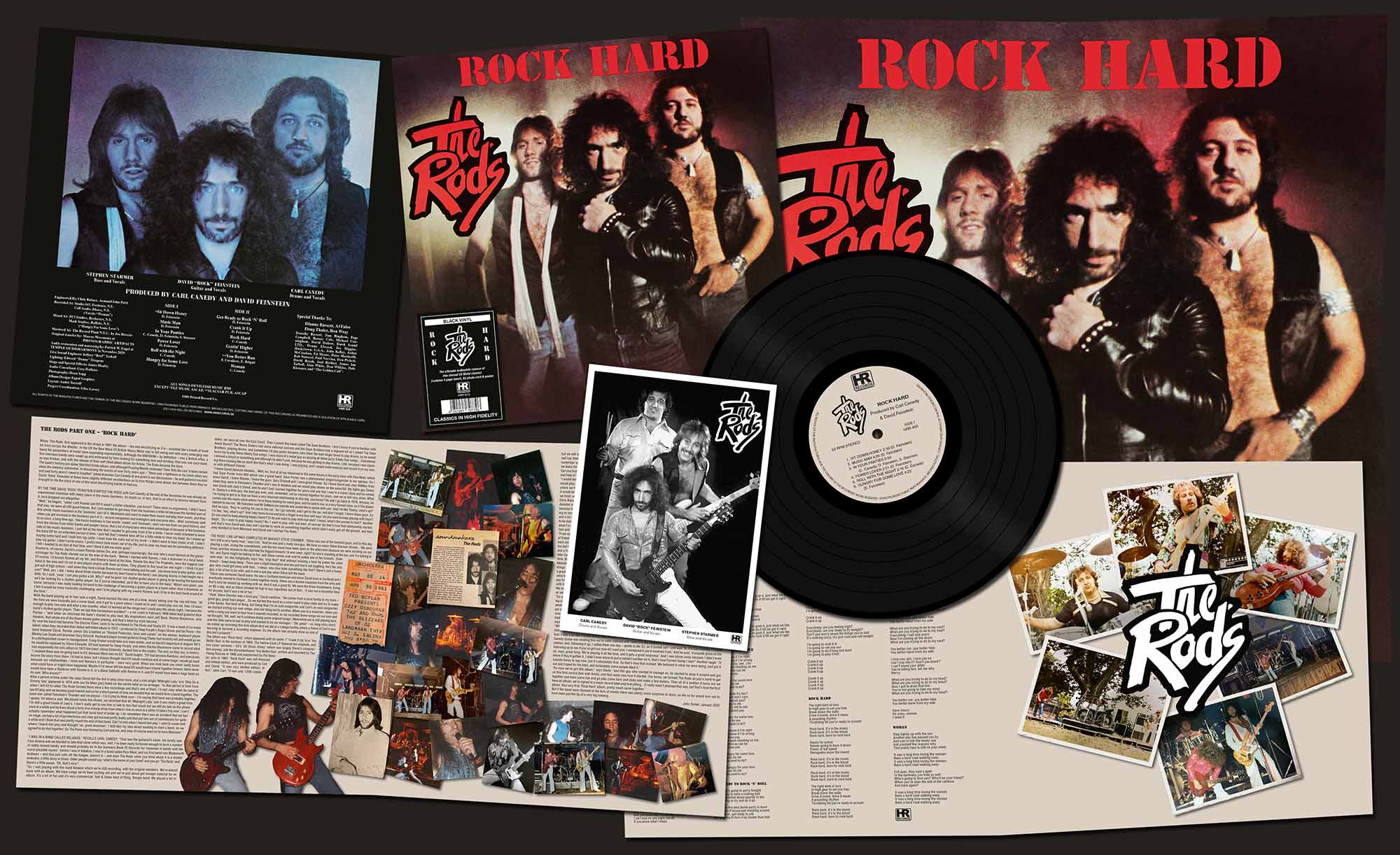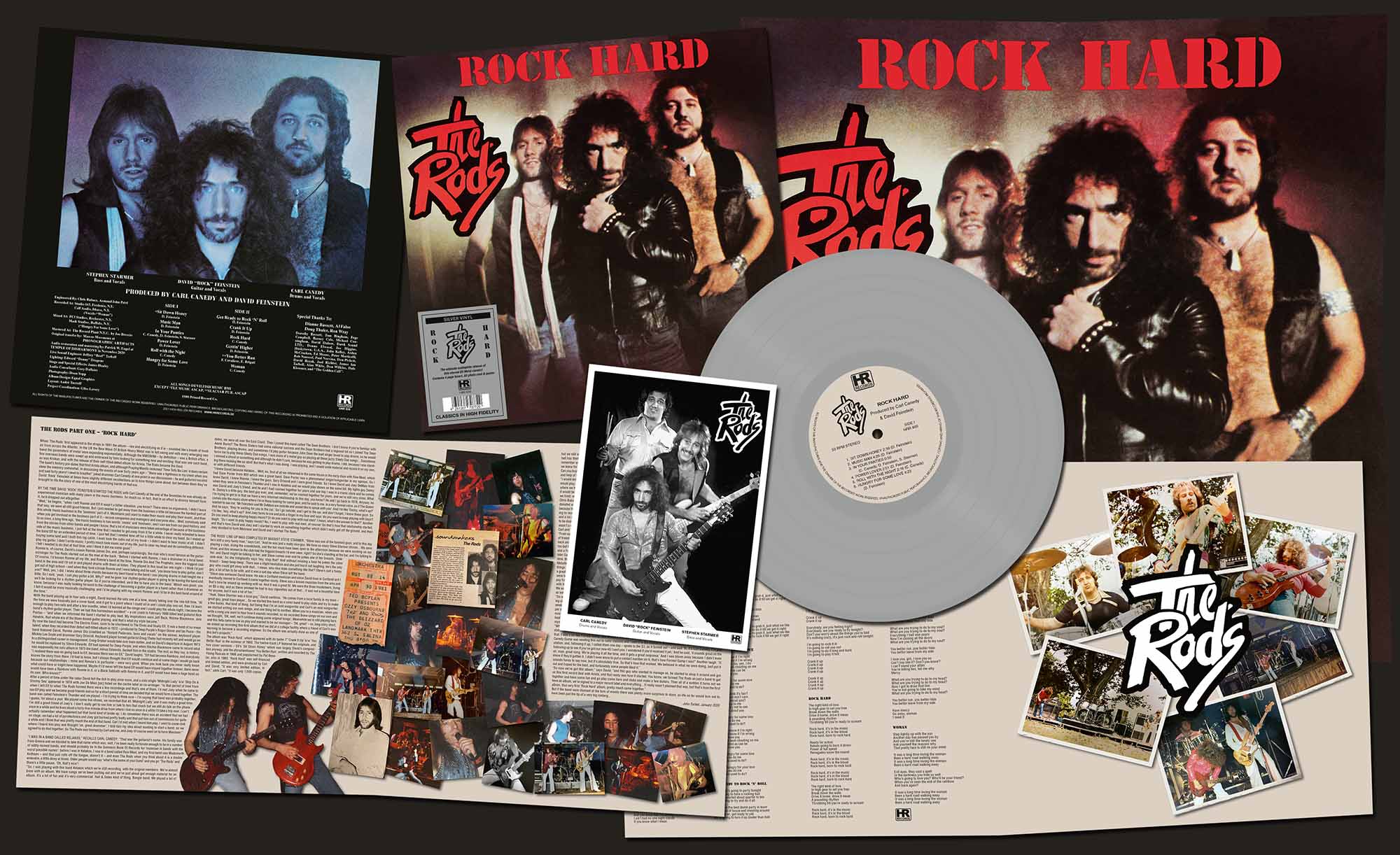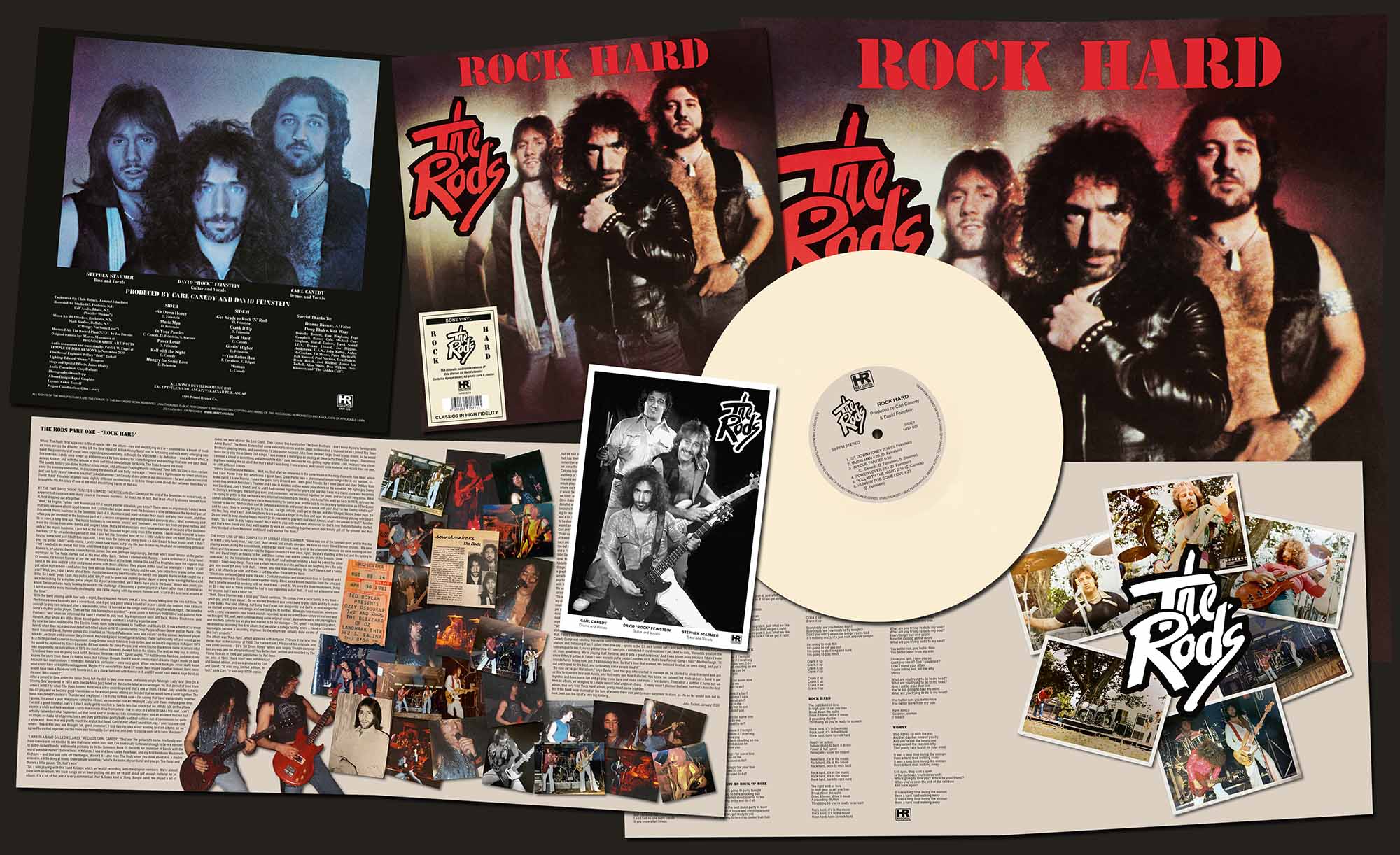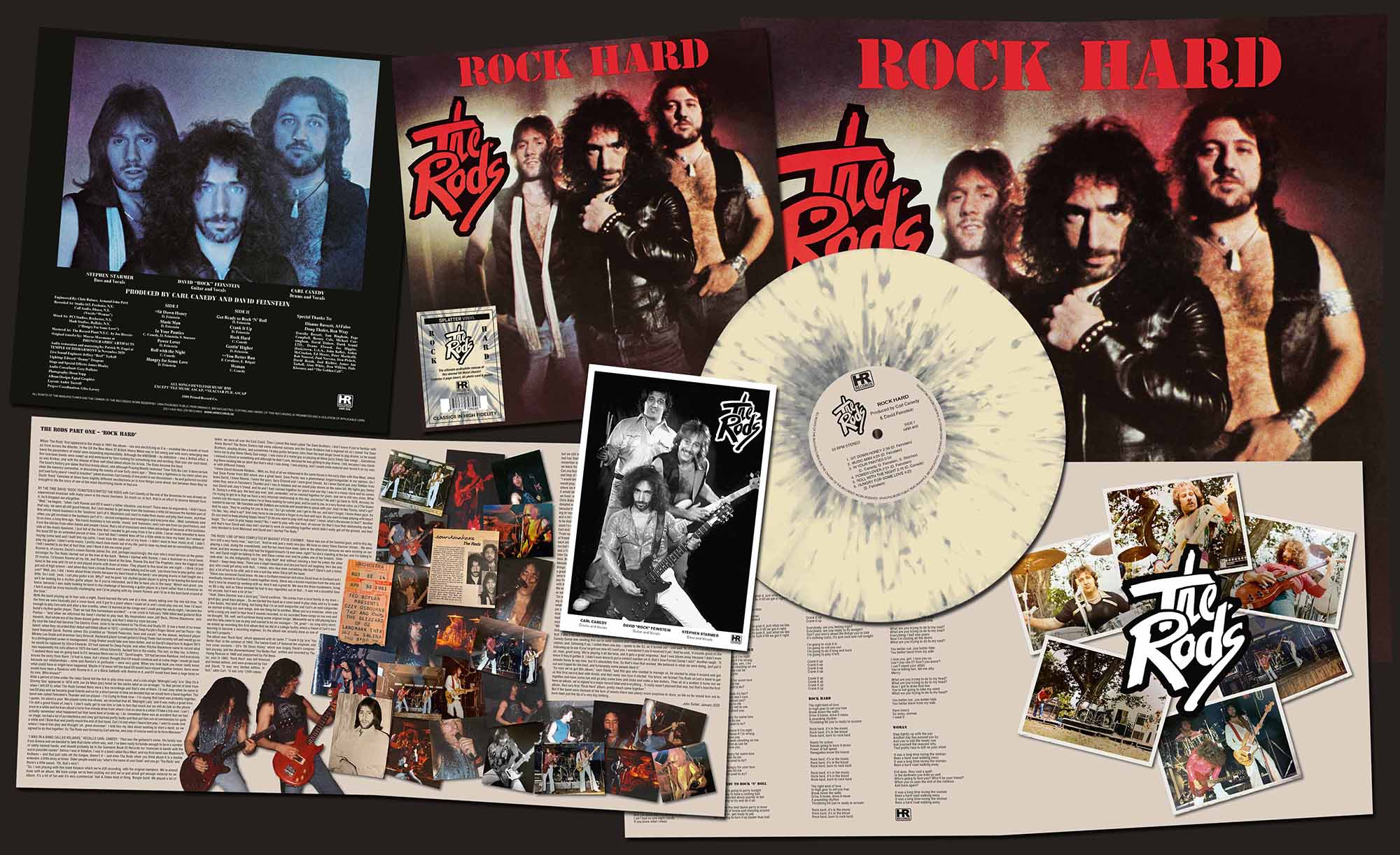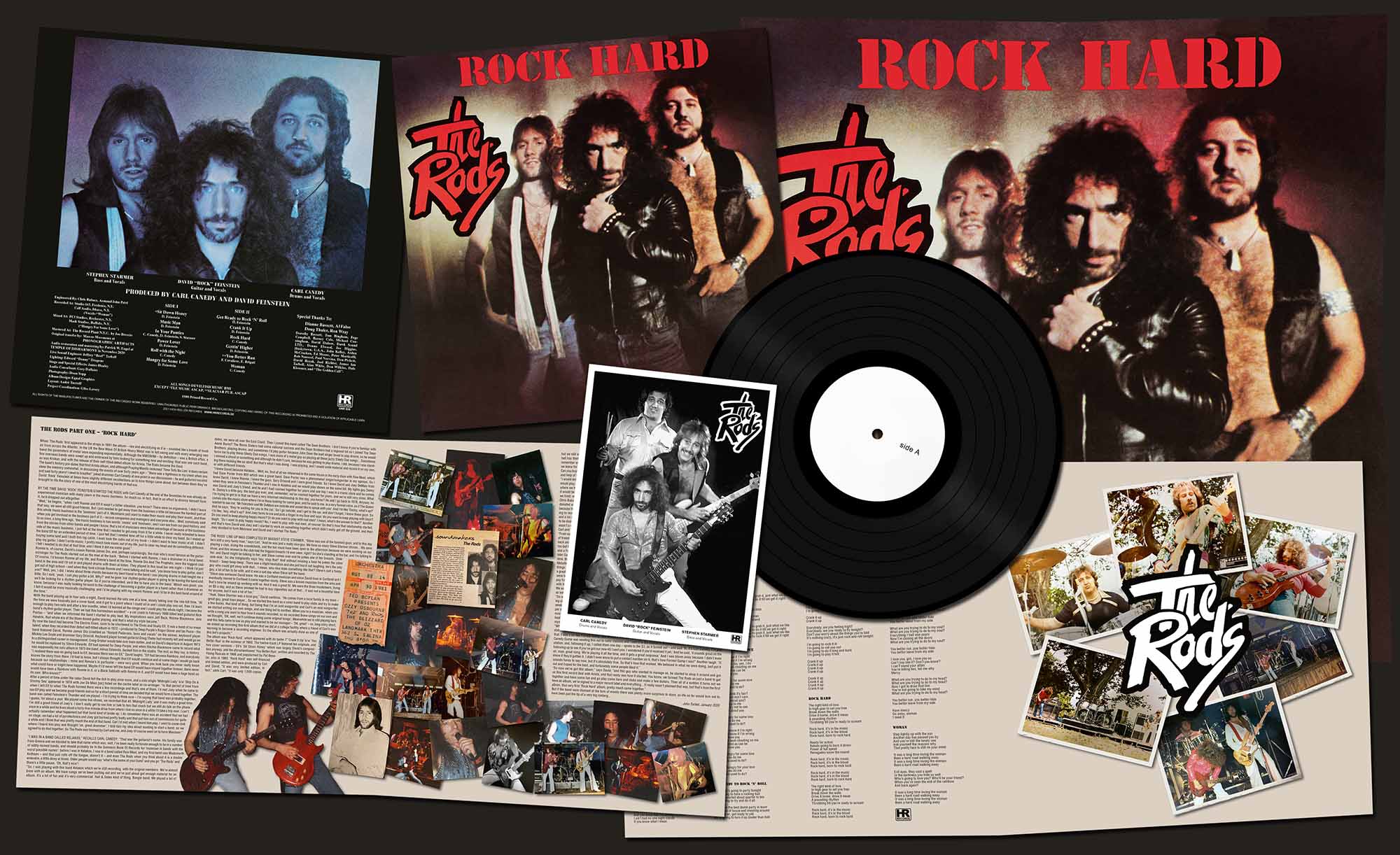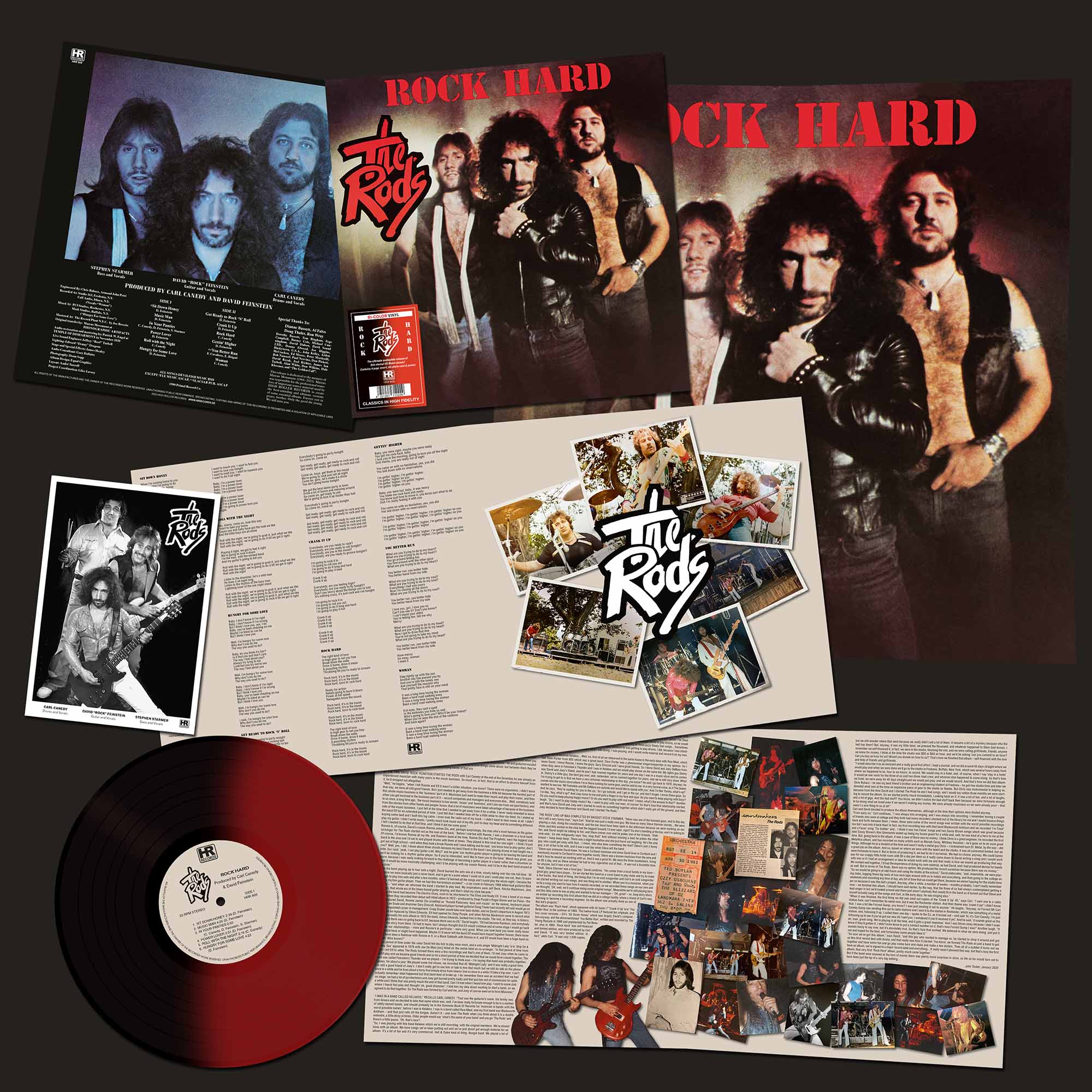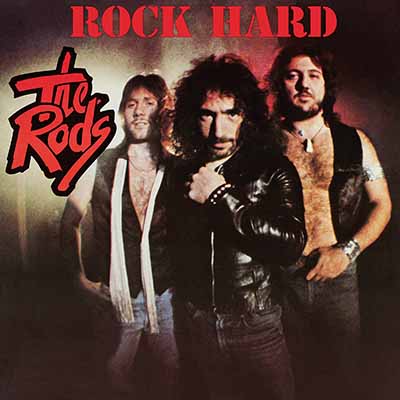 | ||||
| THE RODS - Rock Hard LP | |
HRR 809LP, ltd 750, 250 x black, 250 x silver, 150 x bone + 100 x bone/ silver splatter vinyl (HRR Mailorder exclusive), 425gsm heavy cardboard cover, 4 page insert printed on uncoated paper, A5 photo card, poster, 2nd pressing, ltd 500, 250 x black + 250 x red/ black bi-color | |
| David “Rock” Feinstein - Guitar & Vocals Stephen Starmer - Bass & Vocals Carl Canedy - Drums & Vocals | |
| 01 Sit Down Honey (Elf cover) 02 Music Man 03 In Your Panties 04 Power Lover 05 Roll With The Night 06 Hungry For Some Love 07 Get Ready To Rock & Roll 08 Crank It Up 09 Rock Hard 10 Gettin' Higher 11 You Better Run (The Young Rascals cover) 12 Woman | |
| 1st pressing: LAST COPIES! 2nd pressing: AVAILABLE | |
Original vinyl transfer by Marcus Mossmann (R.I.P.) at PHONOGRAPHIC ARTIFACTS in March 2021.
Audio cleaning, restoration and mastering by Patrick W. Engel at TEMPLE OF DISHARMONY in April 2021. Cutting by SST Germany on Neumann machines for optimal quality on all levels...
The ultimate audiophile reissue of this eternal NWOBHM Metal classic!
When ‘The Rods’ first appeared in the shops in 1981 the album – raw and electrifying as it is – sounded like a breath of fresh air from across the Atlantic. In the UK the New Wave Of British Heavy Metal was in full swing and with every emerging new band the parameters of metal were expanding exponentially. Although the NWOBHM – by definition – was a British affair, a few overseas bands were swept up and embraced by fans looking for something new and exciting: Riot was one such band, as was Krokus, and with the release of their self-titled debut album for Arista, The Rods became the third.
The band’s history pre-dates that first Arista album, and although Praying Mantis reckoned ‘Time Tells No Lies’ it does certain skew the memory somewhat. In discussing the events of over forty years ago – “there was a tightness in my chest when you just said forty years! I need to breathe!” joked drummer Carl Canedy at one point in our discussions – he and guitarist/vocalist David ‘Rock’ Feinstein at times have slightly different recollections as to how things came about; but between them they’ve brought to life the story of one of the most electrifying bands of that era.
BY THE TIME DAVID ‘ROCK’ FEINSTEIN STARTED THE RODS with Carl Canedy at the end of the Seventies he was already an experienced musician with many years in the music business. So much so, in fact, that in an effort to divorce himself from it, he’d dropped out altogether.
“Well,” he begins, “when I left Ronnie and Elf it wasn’t a bitter situation, you know? There were no arguments, I didn’t leave that way, we were all still good friends. But I just needed to get away from the business a little bit because the hardest part of this whole music business is the ‘business’ part of it. Musicians just want to make their music and play their music, and then when you get involved in the business part of it – record companies and managers and everyone else... Well, somebody said to us once, a long time ago, ‘the music business is two words: ‘music’ and ‘business’, and I can see from our past history, and from the stories from other bands and people I know, that a lot of musicians were taken advantage of because of the business side of the music business. I just felt at the time that I needed to get away from it for a while. I never really intended to leave the band Elf for an extended period of time. I just felt that I needed time off for a little while to clear my head. So I ended up buying some land and I built this log cabin. I even took the radio out of my truck – I didn’t want to hear music at all. I didn’t play my guitar, I didn’t write music, I pretty much took music out of my life, just to clear my head and do something different. I felt I needed to do that at that time, and I think it did me some good.”
Ronnie is, of course, David’s cousin Ronnie James Dio, and, perhaps surprisingly, the man who’s most famous as the guitarist/singer for The Rods started out as the man at the back. “Before I started with Ronnie, I was a drummer in a local band. Of course, I’d known Ronnie all my life, and Ronnie’s band at the time, Ronnie Dio And The Prophets, were the biggest club band in the area and I’d sat in and played drums with them at times. They played in this local bar one night – I think I’d just got out of high school – and when they took a break Ronnie and I were talking and he said, ‘you know how to play guitar, don’t you?’ Well, yes, I did. I knew about three chords because my best friend in the band I was playing drums in had taught me a little. So I said, ‘yeah, I can play guitar a bit. Why?’ and he goes ‘our rhythm guitar player is going to be leaving the band and we’ll be looking for a rhythm guitar player. So if you’re interested, we’d like to have you in the band.’ Which was great, you know, because I was really looking forward to the challenge of becoming a guitar player in a band rather than a drummer as I felt it would be more musically challenging; and I’d be playing with my cousin Ronnie; and I’d be in the best band around at the time.”
With the band playing up to four sets a night, David learned the sets one at a time, slowly taking over the role full-time. “At the time we were basically just a cover band, and it got to a point where I could sit in and I could play one set, then I’d learn enough to play two sets and after a few months, when I’d learned all the songs and I could play the whole night, I became the band’s rhythm guitar player. Then we had this horrendous accident” – a car crash in February 1968 killed lead guitarist Nick Pantas – “and when we reformed the band I started to play lead. My inspirations were Jeff Beck, Ritchie Blackmore, Jimi Hendrix, that whole era of the blues-based guitar playing, and that’s what my style became.”
By now the band had become The Electric Elves, soon to be shortened to The Elves and finally Elf. It was a band of no mean talent: when they recorded their debut self-titled album in 1972 – produced by Deep Purple’s Roger Glover and Ian Paice – the band featured David, Ronnie James Dio (credited as “Ronald Padavona, bass and vocals” on the sleeve), keyboard player Mickey Lee Soule and drummer Gary Driscoll. Keyboard player turned guitarist Doug Thaler had recently left and would go on to a distinguished career in management. Craig Gruber would take over bass duties, and on David’s departure in August 1973 he would be replaced by Steve Edwards. Elf had opened for Deep Purple, and when Ritchie Blackmore came to record what was supposedly his solo album in 1975 the band, minus Edwards, backed him in the studio. The rest, as they say, is history.
“I realised there was no going back to Elf, because there was no Elf,” David laughs. “Elf had become Rainbow, and everybody knows the story from there. I’d had to leave, but I always thought that Elf would continue and at some stage I would go back because our relationships – mine and Ronnie’s in particular – were very good. When you look back you never really know what could have or might have happened. Maybe if I’d never left the band Elf would have stayed together forever, there never would have been a Rainbow with Ronnie in it, or a Black Sabbath with Ronnie in it, and Elf would have been a huge band on its own. Who knows?”
After a period of time under the radar David felt the itch to play once more, and a solo single ‘Midnight Lady’ b/w ‘Ship On A Stormy Sea’ appeared in 1978 with Joe De Maio [sic"> listed on the centre label as co-arranger. “In that period of time from when I left Elf to when The Rods formed there were a few recordings and that’s one of them. I’d met Joey when he came to see Elf play and we became good friends and so for a short period of time we decided that we would form a band together. The band was called Feinstein’s Thunder and we played – I’m trying to think now – I’m saying that band was probably together, I guess, for about a year. We played some live shows, we recorded that 45 ‘Midnight Lady’ and it was really a great time. I’m still a good friend of Joey’s. I don’t really get to see him or talk to him that much but we still do talk on the phone once in a while and he lives about a forty-five minute drive from where I live so once in a while I’ll take a trip over. I can’t actually remember what happened but that band kind of broke up. I do remember there was an accident that we had on stage, we had a lot of pyrotechnics and Joey got burned pretty badly and that put him out of commission for quite a while and I think that was pretty much the end of that band. Carl I’d met when I heard him play. I went to some club where I heard him play and thought ‘oh, great drummer’. I told him my idea about wanting to start a band, so we agreed to do that together. So The Rods was formed by Carl and me, and Joey of course went on to form Manowar.”
“I WAS IN A BAND CALLED KELAKOS,” RECALLS CARL CANEDY. “That was the guitarist’s name. His family was from Greece and we decided to take that name which was, well, I’ve been really fortunate enough to be in a number of oddly-named bands, and should probably be in the Guinness Book Of Records for ‘musician in bands with the worst possible names’: before I was in Kelakos, I was in a band called Raw Meat, and my first band was Wadsworth Anthium – and that just rolls off the tongue, doesn’t it – and even The Rods when you think about it is a double entendre, a little dicey at times. Older people would say ‘what’s the name of your band’ and you go ‘The Rods’ and there’s a little pause. ‘Oh, that’s nice’!
“So, I was playing with this band Kelakos which we’re still recording, with the original members. We’re almost done with an album. We have songs we’ve been putting out and we’ve just about got enough material for an album. It’s a lot of fun and it’s very commercial. Hall & Oates kind of thing. Boogie band. We played a lot of dates, we were all over the East Coast. Then I joined this band called The Dean Brothers. I don’t know if you’re familiar with Annie Burns? The Burns Sisters had some national success and the Dean Brothers had a regional hit so I joined The Dean Brothers, playing drums, and sometimes I'd play guitar because John Dean the lead singer loved to play drums, so he would force me to play these Steely Dan songs. I was more of a metal guy so playing all these jazzy Steely Dan songs... Sometimes I missed a chord or something and although he didn’t care, because he was getting to play drums, I did, because I was standing there looking like an idiot! But that’s what I was doing. I was playing, and I would write material and record it on my own, or with different friends.
“I knew David because Kelakos... Well, no, first of all we rehearsed in the same house in the early days with Raw Meat, which had Dave Porter from 805 which was a great band. Dave Porter was a phenomenal singer/songwriter in my opinion. So I knew David, I knew Ronnie, I knew the guys, Gary Driscoll and I were good friends. So I knew David and Joey DeMaio from when they were in Feinstein’s Thunder and I was in Kelakos and we would play shows on the same bill. My lights guy Danny was David and Joey’s friend, and he and I had roomed together for years and one day I was in a music store and he comes in. Danny’s a little guy, the best guy ever, and, remember, we’ve roomed together for years, and we’re still very close. What I’m trying to get to is that we have a very informal relationship to this day, you know? He and I go back to 1976. Anyway, he comes into the music store where I’m in there looking for some gear, and he said to me, in a very formal voice, as if The Queen wanted to see me: ‘Mr Feinstein and Mr DeMaio are outside and would like to speak with you’. And I’m like ‘Danny, what’s up?’ And he says, ‘they’re waiting for you in the car.’ So I go outside, and I get in the car, and don’t forget, I know these guys. So I’m like, ‘hey, what’s up?’ And Joey turns to me and puts a finger in my face and says ‘do you want to keep playing with boys? Do you want to keep playing happy music? Or do you want to play with real men!’ I mean, what’s the answer to that?” Another laugh. “Do I want to play happy music? No, I want to play with real men, of course! So that’s how that relationship started, and that’s how David and Joey and I started to work on something together which didn’t really get off the ground, and then Joey decided to form Manowar and David and I started The Rods.”
THE RODS’ LINE-UP WAS COMPLETED BY BASSIST STEVE STARMER. “Steve was one of the funniest guys, and to this day he’s still a very funny man,” says Carl. “And he was just a really nice guy. We have so many Steve Starmer stories... We were playing a club, doing the soundcheck, and the bar must have been open in the afternoon because we were working on our show, and this woman in the club had the biggest breasts I’d ever seen, right? So she’s standing at the bar, and I’m talking to her, and David might be talking to her, and Steve comes over and he pokes one of her breasts. ‘Oink-oink-oink.’ So she indignantly says ‘hey, stop that!’ And without missing a beat he pokes the other breast – ‘beep-beep-beep’. There was a slight hesitation and she just burst out laughing. He’s the only guy who could get away with that... I mean, who else does something like that? Steve’s just a funny guy, a lot of fun to be with, and it was a sad day when Steve left the band.
“Steve was someone David knew. He was a Cortland musician and since David lives in Cortland and I eventually moved to Cortland it came together nicely. Steve was a known musician from the area and that’s how he wound up working with us. And it was a great fit. We were the three musketeers, living on $5 a day, and as Steve smoked he had to buy cigarettes out of that... It was not a bountiful time for anyone, but it was a lot of fun.”
“Yeah, Steve Starmer was a local guy,” David confirms. “He comes from a local family in my town – great guy, great bass player... So we started this band as a cover band to play clubs and try to make a few bucks, that kind of thing, but being that I’m an avid songwriter and Carl’s an avid songwriter we started writing our own songs, and one thing led to another. When you’re a musician, when you write a song you want to hear how it sounds recorded, so we recorded these songs on our own and we thought, ‘OK, well, we’ll continue doing some original songs’. Meanwhile we’re still playing bars and this fella came to see us play and wanted to be our manager – ‘OK, great’ – so, long story short, we ended up recording this first album that we did at a college facility where a friend of Carl’s was learning to become a recording engineer. So the album was actually done as one of this kid’s projects.”
The album was ‘Rock Hard’, which appeared with its taster 7”‘Crank It Up’ b/w ‘You Better Run’ in the summer of 1980. The twelve-track LP featured ten originals, and two cover versions – Elf’s ‘Sit Down Honey’ which was largely David’s composition anyway, and the aforementioned ‘You Better Run’, written and recorded by The Young Rascals in 1966 and popularised by Pat Benatar, also in 1980. ‘Rock Hard’ was self-financed and limited edition, and were produced by Carl and David. “It was very limited edition, in fact,” adds Carl. “It was only 1,000 copies, but we still wonder where that went because we really didn’t sell a lot of them. It remains a bit of a mystery because who the hell has them? But, anyway, it was my little label, we pressed the thousand, and whatever happened to them God knows. I remember we self-financed it, in fact, we were in the studio, finishing the mix, and we were calling girlfriends, friends, anyone we knew for money. I think at the time the studio was $50 or $60 an hour, and we’d be asking ‘can you commit to an hour? Can you buy an hour for us? Would you donate an hour to us?’ That’s how we finished that album – self-financed with the love and help of friends and girlfriends.
“I would describe it as an innocent and a really good first effort. I kept a journal, and we did around 45 days straight where we would play and when we were done we’d go to the studio in Fredonia, Buffalo, New York, which was several hours away from where we happened to be, four to six hours, to record. We would stay in a hotel, and, of course, when I say ‘stay in a hotel’ it would be one room for the three of us and two-three road crew, and whoever else happened to come along. So that’s how we lived: we were away for 45 days straight and we would just play, and we would record. And that’s how we did that album. Chris Bubacz – he was my best friend’s brother and an engineering student at Fredonia – he got free studio time and later we donated what was at the time an expensive piece of gear to the studio as thanks. But Chris was instrumental in helping us, because from the time David and I started The Rods he and I had songs, and I would say within three months we were starting to record the album. So we started pretty much immediately. Looking back on it, it was a lot of fun, and a lot of laughs, and a lot of gigs. And the bad stuff? You know, we didn’t notice the bad stuff back then because we were fortunate enough to be doing what we loved even if we weren’t making any money. We were already musicians so we were already poor – that wasn’t a new thing to us at all!”
Carl and David decided to produce the album themselves, although at the time their options were limited anyway.
“From early on,” Carl continues, “I was always into arranging, and I was always into recording. I remember having a couple of friends who were at college and they both had mono recorders checked out of the library for me and I would bounce things back and forth between them. I mean, these were some of the worst songs ever written with the worst possible recordings too but I was into it back then! In fact, my first recording was with that band Wadsworth Anthium and we recorded ‘I’m Tired’ and a Faces’ song ‘Tin Soldier’ and... I think it was two Faces’ songs and two Savoy Brown songs which was great because later Savoy Brown’s Kim Simmonds ended up being my house guest for a while and, well, he was kind of a hero to me at the time. But, going back to the album, it was a case of there was no money. I think Chris is a great engineer; he recorded the first Metallica album, and has recorded so many artists such as Mariah Carey, Whitney Houston – he’s gone on to do such great things. Although he as a student at the time and wasn’t really a metal guy Chris – I nicknamed hum Dr. Metal, by the way – did a great job on the album. And so, based on where we were with the talent and the studio, it was all somewhat limited, but we were fortunate to have it. But in terms of producing it, we had to do it ourselves. We had no choice, anyway. We could barely pay for our crappy little hotel room with $5 a day per diem so it really came down to David writing a song and I would work with him or if I had an arrangement or idea he would work with me and that really is how we wound up producing that way. We worked well together, I’d had the experience of doing my own material, as had David, and I had produced demos for bands as well. But in terms of The Rods, there was no option. We produced the record ourselves because there was no money.”
“So we would be going in at odd hours and using the studio at the school,” David elaborates, “and, meanwhile, we were playing clubs, lugging these big reels of two-inch tape around with us in hotels and everything, and then going to the college on weekends and recording any time of day, any bit of time that we could get there, because we weren’t paying for the studio time per se because it was this kid’s project. Anyway, after a while, a number of weeks – months probably, I can’t really remember now – we finished this album. I should have said earlier, by the way, that the three of us had always contemplated getting a lead singer in but we’d looked around and there just wasn’t anybody that would fit in the band so it turned out that Steve and myself actually sang all the songs and Carl, in the early days, he was singing also.”
“When it was finished, the first thing we did was send out copies of the ‘Crank It Up’ 45,” says Carl. “I sent one to a radio station here, can’t remember its name now, but it was the Rochester station. And their theme was ‘crank it up!’ I didn’t know that. I was a bit like Forrest Gump, you know? I was just sending it out to anyone.” He laughs. “Anyway, so Forrest Mr Carl Canedy Gump was sending this out to radio stations and I sent it to the station in Rochester, which was something of a metal station, and, following it up, I called them one day – spoke to the DJ, as it turned out – and said ‘hi, it’s Carl Canedy, I’m just following up to see if you’ve got our new 45 I sent you. I wondered if you’d received it yet.’ And he said, ‘it sounds great on the air, man, great song. We’re playing it all the time, and it gets a great response.’ And I was blown away because I didn’t even know if they’d gotten it. I didn’t even know to put a contact number on it, that’s how Forrest Gump I was!” Another laugh. “It sounds funny to say now, but it’s absolutely true. So that’s how that worked. We believed in what we were doing, just put it out and hoped for the best, and fortunately some people liked it.”
“So now we’ve got this album,” says David, “and this guy who wanted to manage us, he started to shop it around and got us this first record deal with Arista, and that really was how it started. You know, we formed The Rods as just a band to get together and have some fun and go play some bars and clubs and make a few dollars. Then all of a sudden it turns out we have an album, we’re signed to a major record label and everything... It really wasn’t planned that way, but that’s how the first album, that very first ‘Rock Hard’ album, pretty much came together.”
But if the band were stunned at the turn of events there was plenty more surprises in store, as life so far would turn out to have been just the tip of a very big iceberg...
John Tucker, January 2021
